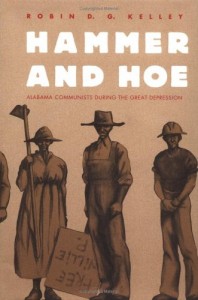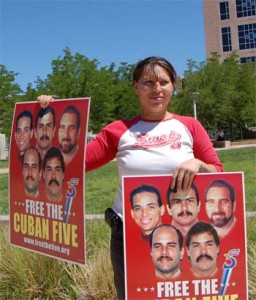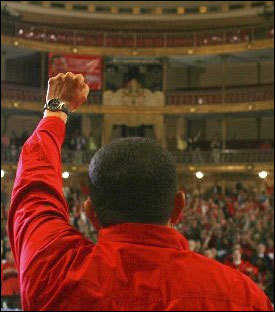 Transcript from National Public Radio, posted for noncommercial, educational purposes.
Transcript from National Public Radio, posted for noncommercial, educational purposes.
Throughout this Black History Month, we have been focusing on new news about black history, new scholarship that has emerged in recent decades that sheds new light on the story of black people in America.
Today, we want to hear about communists in the civil rights movement. Now, thats a sensitive subject since those working for equality have often been accused of being communist in this country, but some were.
And were joined now by Robin Kelley, author of Hammer and Hoe: Alabama Communists During the Great Depression. It documents how the Communist Party worked to secure racial, economic and political justice. Hes a professor of American studies and history at the University of Southern California. And this semester, hes the Harmsworth Professor of American History at the University of Oxford. And we welcome you to the program. Thank you for joining us.
Professor ROBIN KELLEY (American History, University of Oxford; Author, Hammer and Hoe: Alabama Communists During the Great Depression): Thanks, Michel. Its great to be here.
MARTIN: How did you get interested in this topic? And as I mentioned, it is a sensitive topic because there are those, for decades, whove worked to tamp down the suggestion that anybody in the civil rights movement was attracted to the Communist Party at all.
Prof. KELLEY: Exactly. And this is a story that actually predates the civil rights movement as we know it, going back to the 1930s. I became interested in this as a doctorate dissertation back in the mid-80s when I was very active in other social movements in actually in the L.A. area. And I wanted to know how the Communist Party organized African-Americans, particularly in places where black people were the majority.
And so, at first, my study took me to South Africa. And I was planning to do a comparative study looking at South Africa and the West South. I couldnt get into South Africa in 1986 because of the state of emergency. And so, I discovered the second blackest place in the world and that is Alabama. And there, I discovered a very vibrant movement that very few people wrote about, there basically are two stories. One memoir by a man named Hosea Hudson and then another story in a book called All Gods Dangers which is about an African-American sharecropper.
MARTIN: All Gods Dangers: The Life of Nate Shaw, I remember that.
Prof. KELLEY: Exactly. But his real name was Ned Cobb. Nate Shaw was a pseudonym. And its a beautiful book that tells his life story and only a portion of it deals with his membership in the communist-led sharecroppers union, which at one point had about 12,000 members in the black belt counties of Alabama.
MARTIN: And were all the members black?
Prof. KELLEY: Well, in Alabama, there was a point when basically all the members, except one, were all African-American sharecroppers and tenant farmers.
MARTIN: How did the Communist Party gets started in Alabama?
Prof. KELLEY: In 1928, the communist position internationally was that African-Americans in the South have the right to self-determination. Meaning: they have the right to create their own nation in the South. In this position that came out of Moscow, it came from other black communists around the globe.
And with that idea in mind, they sent two organizers to Alabama and they went to Birmingham. And they chose Birmingham because it was probably the most industrialized city in the South. And they went there thinking they would organize white workers. And from white workers, black workers would follow. But no white workers had come forward.
And so, the first two organizers was a guy named James Julio(ph), who was a Sicilian worker who had migrated to Alabama, and another guy named Tom Johnson(ph), and together they went out looking for white workers and black workers came.
And black workers came in fairly large numbers right away because to them, they had a memory of reconstruction, the memory of the Civil War. And in that kind of collective memory, they were told that one day the Yankees will come back and finish the fight. Well, when they saw these white communists, they said, oh, good, the Yankees are here. We cant wait to join.
MARTIN: What was the Communist Partys message at that time and why were these black folks so attracted to it?
Prof. KELLEY: Well, there were three things they focused on. One, because it was during the Great Depression, their primary focus was the unemployed. And so their demands were, we want either work or some kind of support from the government. The second thing was, in 1931, we had the famous Scottsboro case, where nine young black men were arrested falsely for raping two white women and they end up going to jail.
Well, these cases happen all the time where black men are falsely accused. The difference was that the Communist Party made the Scottsboro issue an international issue. They put it in the newspapers. They spread the word all over the globe in different languages. And these unknown figures, some of them became a kind of (unintelligible).
And finally, the third thing was basic civil rights: the right to vote, the right to sit on juries, you know, the right to not be Jim Crowed or segregated. These things certainly drew out black working people.
MARTIN: You know, there are civil rights organizations that had the same agenda like the NAACP, for example, which was formed in 1909. Was there overlap between traditional civil rights groups that we know today and the Communist Party or were they are very separate?
Prof. KELLEY: Initially, when the Communist Party arrived and began organizing black workers, the NAACP in Birmingham and all of Jefferson County was just sort of a shadow of itself. They had six dues-paying members. The Communist Party had about 500. And why is that? Because the NAACP at that time, at least locally, was interested in supporting black business and the black elite and the black middle class. They didnt really have a civil rights agenda per se.
And when the Scottsboro case opened up, the leader of the NAACP, Walter White, his concern was whether or not these boys did it. Whereas the communists said, look, we know that theyre class war prisoners. We know that theyre victims. And they made a big case out of it.
So, pretty soon, the NAACP and the Communist Party began competing for the hearts and minds of the parents of the boys. And nationally, NAACP leaders said that, look, whatever you do, dont let the communist win.
MARTIN: At its height, how many members would you say the Communist Party had in Alabama, particularly among African-Americans?
Prof. KELLEY: Well, theres a couple of ways to think about this. One, in terms of actual dues-paying members, they never had more than 600, 700. But then, if you look at all the other auxiliary organizations, the International Labor Defense, which focused on civil rights issues, they had up to 2,000. The Sharecroppers Union had up to 12,000. You had the International Workers Order. You had the League of Young Southerners. You had the Southern Negro Youth Congress. If you add up all these organizations, it touched the lives easily of 20,000 people.
MARTIN: There is a lot about this period that is not talked about today, for example, the way lynchings actually occur, you know, as public spectacle or something. And I mean, a lot of people like to think that these are like isolated incidents when they were not. And so, one of the things that I think people do understand is how violently the political white establishment – lets just say it – would fight back against attempts to organize among blacks. It sort of put down any sort of stirrings of leadership. So, how did all these people function in these organizations?
Prof. KELLEY: Well, we have to divide the history of the party up into two periods. From 1930 to about 35, they were really underground, you know? After 35, they kind of came aboveground and tried to become legitimate. And thats another story. But lets talk about the underground period. On the one hand, they did have public demonstrations and it did confront the police. Many people were beaten during these demonstrations, including white activists who are communists.
But how do they maneuver? What they had to do was basically take advantage of the invisibility as black people to function. Give (unintelligible) example, whenever they had to put out leaflets, sometimes black women who are communists would pose as laundry workers and carry what appeared to be laundry into the house of a white comrade. But inside those baskets, might be paper and a mimeograph machine.
MARTIN: Hmm.
Prof. KELLEY: And then they would make the mimeograph. Then they bring the leaflets out to pass these leaflets on to workers who would go to their jobs. And when no one’s looking, drop the leaflets on the ground, let the wind blow them everywhere and pretend like they dont know anything about it. In the rural areas, they might put up, you know, little posters and leaflets up in trees late at night when no one will see them. And then, you know, if you compare, say, a place like New York City where in the period when so many families were being evicted from their apartments because they cant pay the rent, what they do in New York is they confront the police. They put the furniture back in the house, they’d stand up.
But in Alabama they do little secret things, like if the water was turned off, communists would figure out a way to turn the water back on. Or if the electricity was turned off, they used jumper cables to run electricity. Or, if someone got evicted from their home, the communists, as a group, would go to the landlord and say, look you have a choice, you need to put that guy or that family back into their house or the next day your house may turn into firewood.
My favorite story is, you know, one of the big issues for unemployed people was getting relief from social workers. And sometimes it would be impossible just to get your basic flour and lard and whatever. And whenever workers had trouble with social workers, the Communist Party would get penny postcards and write on these penny postcards, anonymously: The workers are watching you. And send them to the social worker.
MARTIN: Hmm.
Prof. KELLEY: To threatening them to basically give the people what they need. And so, these are all ways in which they maintained an invisibility, but were very, very present on behalf of the working class.
MARTIN: If youre just joining us, youre listening to TELL ME MORE from NPR News. Im speaking with historian Robin Kelley for our Black History Month series. Were talking about African-Americans and the Communist Party in Alabama. He wrote about it in his book Hammer and Hoe. How successful do you think the Communist Party was at brining about a change in Alabama, which is the place that you seem to think it was the most effective or widespread, or at least the most present in this period? And the reason Im asking is that even now, I mean, Alabama has yet to elect an African-American to a state white office, for example.
Prof. KELLEY: Right.
MARTIN: One person who is running now, Congressman Artur Davis. But if hes look he will be the first till 2010. So, how effective do you think the Alabama Communist Party was?
Prof. KELLEY: Well, I think it was very effective in some areas. One, even in training and organizing. Some of the most important organizers in steel, in iron were communists; who, after 1935, were some of the lead organizers in training and organizing, which really made a difference in workers lives in the 50s and 60s. The other thing is that there were many people who were trained in the Communist Party who went on to become Civil Rights activists. Asbury Howard, who was a radical (unintelligible) who went onto to play a significant role in Alabamas Civil Rights Movement.
And then, Rosa Parks. Was does Rosa Parks had to do with any of this? Well, some of her first political activities were around the Scottsboro case, you know? She never joined the party, but as a young woman, she and her husband, in fact, attended some of the meetings. Then the other area is, just in the rural areas – this may seem like a small thing, but imagine if youre picking cotton at basically 30 cents a day and you fight and fight and you can get your wages up to 50 cents or a dollar a day. It took about five years and a lot of blood shed, but they were able to raise the wages as a result.
So, they may not be huge victories, but I know one thing, the infrastructure that was laid forward becomes the Civil Rights Movement in Alabama, was laid in many ways, not entirely, by the Communist Party.
MARTIN: Why do you think this history isnt better known? I mean, these are not the names and the faces that you see on the calendars?
Prof. KELLEY: They are not. And part of it has to do with a long history and the Cold War, and the fact that we think of communist as these terrible horrendous people. But more importantly, if you think of them as somehow outside of American culture and history, when what I and others who have written on similar areas have argued, is that is very much native and home grown. I mean, the Communist Party in Alabama, they began their meetings with a prayer.
These were Christians. These people believed in Jesus, in redemption. And they believed in armed self defense, and they believed that Russia would come and save them if anything got to be really bad. It just made perfect sense to those who lived in that period.
MARTIN: What happened to the Communist Party in Alabama? How do it does it still exist – I guess, maybe it would be the question. I dont know. Are they still there? Is anybody still around?
Prof. KELLEY: They are sort of around actually, but not like they were. What happened to them? Two things. After 1935, the party decided to come above ground and build alliances with liberals and others who are not communists, but who are against Nazi Germany and Italy and that sort of thing. So, what ends up happening is that, you can form alliances with liberals in New York – you cant do that in Alabama because white liberals are not that friendly – southern liberals. And so, what they did was they gave up a lot of the militancy. They gave up their industrial base and other things for the sake of building alliance with people who dont want to form alliance with them.
And so they lost interest. And many of their main activists left the South and moved North. The other thing that happened was, Bull Connor, who was very active (unintelligible) becomes like the man in the 40s and 50s. And Bull Connor and his police force waged a war on the Communist Party in the middle 40s. By that time, the main organization was called the Southern Negro Youth Congress, which was not entirely communist, but it was a group of young black men and women who, in fact, prefigured SNCC, Student Nonviolent Coordinating Committee. And they had their last meeting in Birmingham in 1948 under enormous police repression and violence.
And that sort of spelled the end of them. And so by that time the Communist Party itself, on a national scale, was declining with the Cold War, and the Smith Act and other things which let people to go underground or go to jail. So, it was part of a national process of snuffing out the Community Party as a whole.
MARTIN: Hmm. So, what would you hope people would take away from all the work that youve done, documenting this history?
Prof. KELLEY: Well, first what I really emphasize is the fact that these were ordinary people, most of whom could not read or write, who were able to, on their own, form a very strong and productive movement that saw not just black peoples problems, but all peoples problems as connected. They saw joblessness and Civil Rights, and the right not be raped or lynched, self-protection – that all these things are part of one big struggle. And they really did succeed in building an interracial movement. Even if the whites were in the minority, those whites were there with them. And that vision, that ordinary people can make change, was a legacy they left us.
MARTIN: Historian Robin Kelley is author of Hammer and Hoe: Alabama Communists During the Great Depression. He is professor of American Studies at the University of Southern California. But he joined us from the U.K. where hes current serving as Harmsworth Professor of American history at the University of Oxford. And his latest book is Thelonious Monk: The Life and Times of an American Original. Thank you so much for contributing to our Black History Month series.
Prof. KELLEY: Thank you, really enjoyed it.
(Soundbite of music)
MARTIN: In a moment, our moms conversation. A collection of essays challenges what many of us think of as requirements for a happy home.
Ms. REBECCA WALKER (Social Commentator; Author, One Big Happy Family): Looking at these families deepened my sense of compassion for my own family.
MARTIN: Rebecca Walker is with us to talk about her new book, One Big Happy Family. Thats just ahead on TELL ME MORE from NPR News.
 Stop the Wars in Iraq and Afghanistan!
Stop the Wars in Iraq and Afghanistan!














